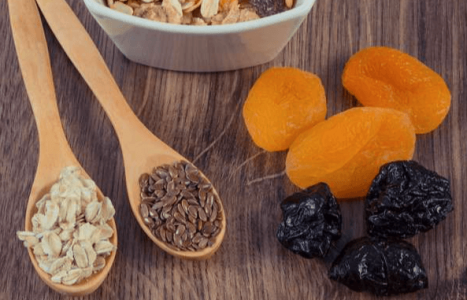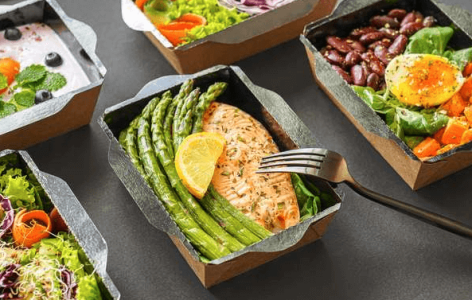What to eat and what to avoid to prevent cancer, according to an expert
- Replies 2
As we all approach our golden years, keeping an eye on our well-being and taking care of ourselves becomes increasingly important.
One way we can achieve this, especially concerning cancer prevention, is by nurturing our diets and nutrition to give ourselves the best chance of warding off this and other diseases.
Cancer has many risk factors that are beyond our control. However, certain factors, such as diet, can be changed or managed to reduce the risk of developing this life-altering illness.
Dr Brian Slomovitz, the Director of Gynecologic Oncology and Co-chair of the Cancer Research Committee at Mount Sinai Medical Center, supports this notion.
'First, we know that the rate of obesity is high and continually increasing, and it's a risk factor for many cancers. A healthy, balanced diet will help reduce the incidence of these cancers,' he said.
So, dietary changes can significantly impact our long-term health and our likelihood of developing cancer.
Nichole Andrews, a Registered Dietitian Nutritionist and Cancer Nutrition Specialist, has shared her essential tips on incorporating cancer-fighting components into our diet, consuming more cancer-protective foods, and minimising cancer risk through dietary choices as much as possible.
Here's what she suggests.
1. Plant-based food
When switching up your lifestyle to have the best chance at preventing cancer, Andrews recommends that you focus on loading your plate with plant-based foods. This could include fruits, vegetables, whole grains, legumes, nuts and seeds.
Why? Because these food items are packed with essential vitamins, minerals, fibre and antioxidants that have all been linked to lower prevalence of various types of cancer.
Making these diet changes and prioritising plant-based food also gives the body all the nutrients needed to stay physically healthy.
2. Choose your proteins carefully
Moving away from processed meats and embracing lean protein sources like chicken, turkey, fish, seafood and plant proteins can also help lower cancer risk.
This is because these options contain lower levels of saturated fats and heme iron, both associated with an increased likelihood of developing cancer, especially colorectal cancer.
Plus, by opting for white meats and fish over red, you're also generally helping yourself maintain a healthier weight, part of avoiding various cancer types.
3. More whole grains
We all love carbs, and while it's impossible to eliminate them from our diets, choosing whole grains over processed ones can positively impact lowering the risk of cancer.
Andrews suggests that you start experimenting with various whole grains, such as brown rice, whole wheat, quinoa, and oats. These grains are rich in dietary fibre, which aids digestion and helps maintain a healthy weight—an important factor in cancer prevention.
They also contain essential vitamins, minerals, and antioxidants that combat inflammation and oxidative stress, two of the root causes of cancer.
4. Increase your fibre consumption
When increasing your daily fibre intake, Andrews recommends aiming for around 30g daily. Achieving this goal is quite attainable, especially if you incorporate her other dietary suggestions.
For instance, consider swapping out white rice and pasta for whole grains, embracing legumes, and choosing fruits, vegetables, and nuts as your go-to snacks instead of processed options. And pay attention to the value of including foods like artichokes, chia seeds, split peas, avocado, quinoa, raspberries, pear, and barley in your diet.
There are also some clever tricks to boost your fibre intake without drastically changing your diet. You can simply add 1/3 cup of bran cereal to your existing cereal to increase your fibre content!

5. Drink healthier beverages
It's no secret that alcohol can increase your risk of developing certain types of cancer. We understand that many of you enjoy the occasional alcoholic beverage, and we're not suggesting you become teetotal.
However, if you want to reduce your cancer risk, it's worth considering healthier drinking habits and swapping alcoholic beverages for non-alcoholic alternatives.
It's also sensible to monitor the sugar content of your drinks, especially in some store-bought sweetened mixes. There's no harm in being mindful of what you're putting into your body!
6. Lower your sodium
Sometimes, we don't even realise it, but all the processed foods we consume and the condiments we add to enhance flavour can impact our health. In this case, we're talking about reducing sodium (salt) consumption to no more than 2,400 mg daily.
High sodium intake is linked to a higher risk of stomach cancer, so it's best to try to reduce our consumption in all aspects.
This means taking a closer look at the nutrition labels of store-bought products, attempting to limit the number of packaged products we eat, and even starting to season our meals with herbs, spices, and natural flavour enhancers instead of salt.

Making smart dietary changes is easier said than done—but as with any habit, it just takes practice. And you can always speak with a nutritionist if you need advice.
That said, none of the information in this article constitutes professional health advice. If you're planning on making drastic changes to your diet, it's important to consult with your GP or a health professional first.
'Prevention is always better than cure,' as the saying goes, so stay smart and be mindful of what you eat for maximum health! We hope you found this article helpful, members! Do you have any other advice to share? Leave it in the comments below!
One way we can achieve this, especially concerning cancer prevention, is by nurturing our diets and nutrition to give ourselves the best chance of warding off this and other diseases.
Cancer has many risk factors that are beyond our control. However, certain factors, such as diet, can be changed or managed to reduce the risk of developing this life-altering illness.
Dr Brian Slomovitz, the Director of Gynecologic Oncology and Co-chair of the Cancer Research Committee at Mount Sinai Medical Center, supports this notion.
'First, we know that the rate of obesity is high and continually increasing, and it's a risk factor for many cancers. A healthy, balanced diet will help reduce the incidence of these cancers,' he said.
So, dietary changes can significantly impact our long-term health and our likelihood of developing cancer.
Nichole Andrews, a Registered Dietitian Nutritionist and Cancer Nutrition Specialist, has shared her essential tips on incorporating cancer-fighting components into our diet, consuming more cancer-protective foods, and minimising cancer risk through dietary choices as much as possible.
Here's what she suggests.
1. Plant-based food
When switching up your lifestyle to have the best chance at preventing cancer, Andrews recommends that you focus on loading your plate with plant-based foods. This could include fruits, vegetables, whole grains, legumes, nuts and seeds.
Why? Because these food items are packed with essential vitamins, minerals, fibre and antioxidants that have all been linked to lower prevalence of various types of cancer.
Making these diet changes and prioritising plant-based food also gives the body all the nutrients needed to stay physically healthy.
2. Choose your proteins carefully
Moving away from processed meats and embracing lean protein sources like chicken, turkey, fish, seafood and plant proteins can also help lower cancer risk.
This is because these options contain lower levels of saturated fats and heme iron, both associated with an increased likelihood of developing cancer, especially colorectal cancer.
Plus, by opting for white meats and fish over red, you're also generally helping yourself maintain a healthier weight, part of avoiding various cancer types.
3. More whole grains
We all love carbs, and while it's impossible to eliminate them from our diets, choosing whole grains over processed ones can positively impact lowering the risk of cancer.
Andrews suggests that you start experimenting with various whole grains, such as brown rice, whole wheat, quinoa, and oats. These grains are rich in dietary fibre, which aids digestion and helps maintain a healthy weight—an important factor in cancer prevention.
They also contain essential vitamins, minerals, and antioxidants that combat inflammation and oxidative stress, two of the root causes of cancer.
4. Increase your fibre consumption
When increasing your daily fibre intake, Andrews recommends aiming for around 30g daily. Achieving this goal is quite attainable, especially if you incorporate her other dietary suggestions.
For instance, consider swapping out white rice and pasta for whole grains, embracing legumes, and choosing fruits, vegetables, and nuts as your go-to snacks instead of processed options. And pay attention to the value of including foods like artichokes, chia seeds, split peas, avocado, quinoa, raspberries, pear, and barley in your diet.
There are also some clever tricks to boost your fibre intake without drastically changing your diet. You can simply add 1/3 cup of bran cereal to your existing cereal to increase your fibre content!

As part of a cancer risk reduction diet plan, Andrews recommends a daily goal of 30 grams of fibre. Credit: Shutterstock.
5. Drink healthier beverages
It's no secret that alcohol can increase your risk of developing certain types of cancer. We understand that many of you enjoy the occasional alcoholic beverage, and we're not suggesting you become teetotal.
However, if you want to reduce your cancer risk, it's worth considering healthier drinking habits and swapping alcoholic beverages for non-alcoholic alternatives.
It's also sensible to monitor the sugar content of your drinks, especially in some store-bought sweetened mixes. There's no harm in being mindful of what you're putting into your body!
6. Lower your sodium
Sometimes, we don't even realise it, but all the processed foods we consume and the condiments we add to enhance flavour can impact our health. In this case, we're talking about reducing sodium (salt) consumption to no more than 2,400 mg daily.
High sodium intake is linked to a higher risk of stomach cancer, so it's best to try to reduce our consumption in all aspects.
This means taking a closer look at the nutrition labels of store-bought products, attempting to limit the number of packaged products we eat, and even starting to season our meals with herbs, spices, and natural flavour enhancers instead of salt.
Key Takeaways
- Proper nutrition, including a plant-based diet, adequate whole grains and fibres, moderate protein intake, and reduced sodium, can help lower cancer risk.
- Alcohol consumption has been correlated with an increased risk of various types of cancer, and reducing it can decrease risk.
- Nichole Andrews, a Cancer Nutrition Specialist, advises consuming less than 2400 mg of sodium daily to decrease the risk of stomach cancer.
Making smart dietary changes is easier said than done—but as with any habit, it just takes practice. And you can always speak with a nutritionist if you need advice.
That said, none of the information in this article constitutes professional health advice. If you're planning on making drastic changes to your diet, it's important to consult with your GP or a health professional first.
'Prevention is always better than cure,' as the saying goes, so stay smart and be mindful of what you eat for maximum health! We hope you found this article helpful, members! Do you have any other advice to share? Leave it in the comments below!








